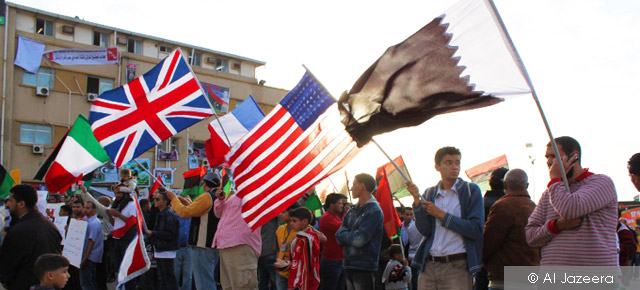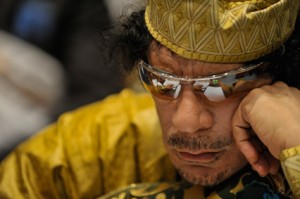
The dramatic ousting in August of Colonel Gaddafi and his sons ten days short of the 42nd anniversary of his coming to power breathed new life into the Arab uprisings. His downfall represented a moment of profound significance for the struggles against dictatorship and authoritarian misrule across the Middle East. These had appeared to be flagging as Saudi Arabia led a counter-revolutionary pushback across the Middle East and North Africa that culminated in its intervention to crush the pro-democracy uprising in Bahrain just five days before the UN authorisation of the No-Fly Zone in Libya. Gaddafi’s flight (and subsequently violent end) captured the attention and aspiration of millions of people yearning for freedom from the decades-long autocracies that they no longer feared.
Yet the six-month conflict in Libya also presaged the arrival of a significant new presence in regional and even international politics. This occurred as Qatar and the United Arab Emirates (UAE) spearheaded a comprehensive approach to assisting regime change in a fellow Arab country. While the toppling of Gaddafi was a one-off and unlikely to be repeated, the two countries’ visible emergence in the international coalition marked a significant step-up in their ambitious attempts at global branding. It also provided the GCC states with a welcome breathing space from the pressures of the Arab Spring as it shifted attention away from difficulties uncomfortably close to home. Moreover, it allowed the Gulf monarchs to position themselves against a repressive and eccentric regime and make a high-profile stand against tyranny elsewhere, even as they turned the other way in its brutal submission in Bahrain.
THE GULF IN LIBYA
Qatar, especially, aligned its support for the protection of human rights and democratic expression with the (Western-led) international community. The Qatari prime minister, Shaikh Hamad bin Jassim bin Jabr al Thani, was instrumental in rallying GCC and Arab League support around the idea of a No-Fly Zone in March, and subsequently recognising the NTC. He further stated that ‘Qatar will participate in military action because we believe there must be Arab states undertaking this action, because the situation is intolerable.’ Moreover, a story run by Qatari-based Al Jazeera on 21 February stating that Gaddafi’s air force was strafing peaceful demonstrators in Tripoli turned out to be untrue, but not before it galvanised world attention onto the regime’s brutal doings.
The UAE joined Qatar in leading the charge for finding Arab solutions to Arab problems. Together, they provided military and financial assistance that proved critical to the international coalition and the eventual success of the NTC. Qatari Mirage fighters participated in the NATO-led air strikes and gave the military operations the Arab support necessary to dilute concerns of another Western intervention in the region. Qatar also supplied weapons and training and provided operational advice, as well as special forces which reportedly played a key role in getting the rebels into Tripoli on 20 and 21 August. The full scale of Qatar’s military involvement only became clear after the end of the fighting in October, when the Qatari chief of staff, Major-General Hamad bin Ali al-Attiya revealed that hundreds of troops had operated in every region of Libya, and that the Qataris had also been responsible for the Libyan rebels’ training, communication and strategy.
Qatar was also one of the first countries to recognise the NTC as the legitimate representative of the Libyan people and organised the first meeting of the International Contact Group on Libya in April. Hence, the sight of the Qatari flag flying alongside the rebels’ flag in Gaddafi’s Bab al Aziziya compound after its capture in August was rich in symbolism. Non-military forms of assistance included more than $400 million in financial aid, supplies of water, heating gas and essential goods, and help with selling and marketing Libyan oil. Four tankers of gasoline, diesel and other refined fuels shipped by Qatar Petroleum to Benghazi in June met the majority of the area’s energy needs.
In the UAE, Abu Dhabi (in particular) extended significant logistical and material support to the rebels. The emirate hosted meetings of Libyan provincial and tribal representatives in May and the third meeting of the International Contact Group in June. UAE foreign minister Shaikh Abdullah bin Zayed al Nahyan quickly announced plans to visit Benghazi to see how his country could assist the reconstruction effort. Entities such as the Abu Dhabi Fund for Development could play a significant role as they have long experience of providing loans and development aid to societies in transition. Meanwhile, the Interim Prime Minister, Abdurrahim El-Keib, came to Libya from his position as Departmental Chair in the Petroleum Institute in Abu Dhabi, further cementing the links between the two.
Other GCC states, such as Kuwait, meanwhile joined with Qatar in committing to set up a $260 million funding mechanism to finance the NTC, in addition to sending humanitarian and medical aid. Even Saudi Arabia declared in favour of a managed transition, adding Libya to Syria and Yemen to its list of qualified support for regime change. This stance somewhat qualified the Kingdoms as a counter-revolutionary bulwark resolutely opposed to any challenge to the status-quo. Instead, Saudi declarations – albeit toward a dictatorship whose regime type did not constitute an ideational threat to the Al-Saud – suggested its policy toward the Arab Spring reflected balance of power considerations intermixed with regime security interests.
WHAT WILL THIS MEAN IN A POST-GADDAFI ERA?
 What does the foregoing mean in practice as Libya moves decisively – yet uncertainly – towards a post-Gaddafi era? A number of implications present themselves. The first is that GCC states have rid themselves of a potentially destabilising threat to their internal affairs. Gaddafi’s Libya had a record of involvement in plots against individual Gulf rulers, including current King Abdullah bin Abdul Aziz of Saudi Arabia. Gaddafi’s demise removes an element of unpredictability from a volatile regional scene. It also allows the damaged relationship with the US to recover following tensions over the fall of Hosni Mubarak and the entry into Bahrain of Saudi forces to help quell a pro-democracy movement. Additionally, it enables the Gulf States to establish themselves as responsible international actors: the contrast between their position and South Africa’s obduracy (as it refused to recognise the NTC) could not be clearer.
What does the foregoing mean in practice as Libya moves decisively – yet uncertainly – towards a post-Gaddafi era? A number of implications present themselves. The first is that GCC states have rid themselves of a potentially destabilising threat to their internal affairs. Gaddafi’s Libya had a record of involvement in plots against individual Gulf rulers, including current King Abdullah bin Abdul Aziz of Saudi Arabia. Gaddafi’s demise removes an element of unpredictability from a volatile regional scene. It also allows the damaged relationship with the US to recover following tensions over the fall of Hosni Mubarak and the entry into Bahrain of Saudi forces to help quell a pro-democracy movement. Additionally, it enables the Gulf States to establish themselves as responsible international actors: the contrast between their position and South Africa’s obduracy (as it refused to recognise the NTC) could not be clearer.
On a broader level, the visibility of the UAE and Qatar’s role has played into their ambitious global branding strategies. In the UAE’s case, the arrest and detention of political activists earlier this year dented its credibility among some of its high-profile Western partners. Association with the ousting of a repressive tyrant goes some way to restoring its image in the West and deflect attention from the narrowing spaces of oppositional and public discourse at home. Qatar, for its part, has invested heavily in building a worldwide reputation for diplomatic mediation and conflict resolution. Aligning Qatari interests with the rebels was a risky manoeuvre that could have gone wrong had the uprising faltered, but the depth and breadth of Qatar’s commitment ultimately paid off.
The GCC states now possess considerable leverage over the NTC. Obviously this is strongest in the case of Qatar, which also organised a meeting of the provisional government in waiting on 24 August. This featured a select gathering of close international allies of the NTC. It focused on unlocking frozen Libyan assets to kick-start stabilisation efforts and fund urgent food, fuel and medical supplies. Post-conflict stabilisation and reconstruction play to Qatar’s strengths and interests. Simultaneously, the reopened Libyan consulate in Dubai hosted security talks between the NTC and officials from the UAE, the US, the UK, Canada, and Italy. With a thriving security sector of its own, the UAE may be well-placed to lead on internal and external security issues such as border control, police and security service reorganisation and mine clearance.
Qatar, the UAE and other GCC states may also find themselves playing a greater role in Libyan economic development. Fruitful areas of potential co-operation exist in the energy sector in particular. Although Libya is a major oil producer it has not yet invested significantly in the exploration for, and development of, natural gas. This could bring in Qatari investment and expertise. Energy-related sovereign wealth funds, such as Abu Dhabi’s International Petroleum Investment Company, or entities such as the Abu Dhabi Investment Council which have active alternative investment tracks, might also find suitable opportunities to invest in Libya’s redevelopment. An intriguing new possibility for Gulf inroads is Islamic finance, as NTC Chairman Mustapha Abdul Jalil stated in his 24 October ‘liberation’ speech that Islamic law (Sharia) would form the basis of future legislation, including in finance. With their existing experience in arranging Islamic bonds (sukuk), organising project financing and managing oil wealth, as well as their socio-cultural and linguistic commonality, Gulf-based Islamic banks may be better-placed than their Asian (or British) counterparts to capitalise on any new opportunities.
Yet this engagement must be handled sensitively, and it could yet go wrong. Already, the extent of Qatari involvement has caused controversy and considerable unease within elements of the NTC. As revelations emerged about Qatari funding and arming for multiple Islamist militia groups, including the commander of the feared Tripoli Brigade Abdul Hakim Belhadj, these murky and sub-state networks could hinder a return to stability and normalcy and further fragment the fragile anti-Gaddafi coalition. It was almost certainly Qatar that the NTC oil and finance minister had in mind when he stated in October that “It’s time we publicly declare that anyone who wants to come to our house has to knock on our front door first.” Notably, this sense of disquiet is shared by some Qataris too, as they privately wonder if their leadership has bitten off more than it can chew in engineering the post-Gaddafi transition in Libya.
Events in Libya therefore hold numerous implications for the GCC states. While Gaddafi’s fall inevitably gives a boost to an Arab Spring that appeared to be flagging, it provided an opportunity for the Gulf States to rehabilitate their reputations following the travails of the spring. Qatar’s role, and that played by Al Jazeera in its coverage of the Libyan revolution, will have overturned many observers’ perceptions of the GCC states. Although a peaceful transition in Libya is still far from guaranteed, the Gulf’s role in facilitating it underscores their importance in regional Arab affairs. The fall of Ben Ali and Mubarak in January and February shook Gulf confidence and threatened to unleash a wave of upheaval across the Middle East. Having withstood (at least for now) the local pressures generated by the Arab Spring, even in a Bahrain propped up by mercenary forces, the GCC’s successful Libya policy signifies a return of confidence and a sense that they can, after all, maintain some semblance of control over the calls for change and reform. This confirms the Gulf monarchies as the region’s great survivors, though, as ever, it raises further questions that may only become apparent in the longer-term.